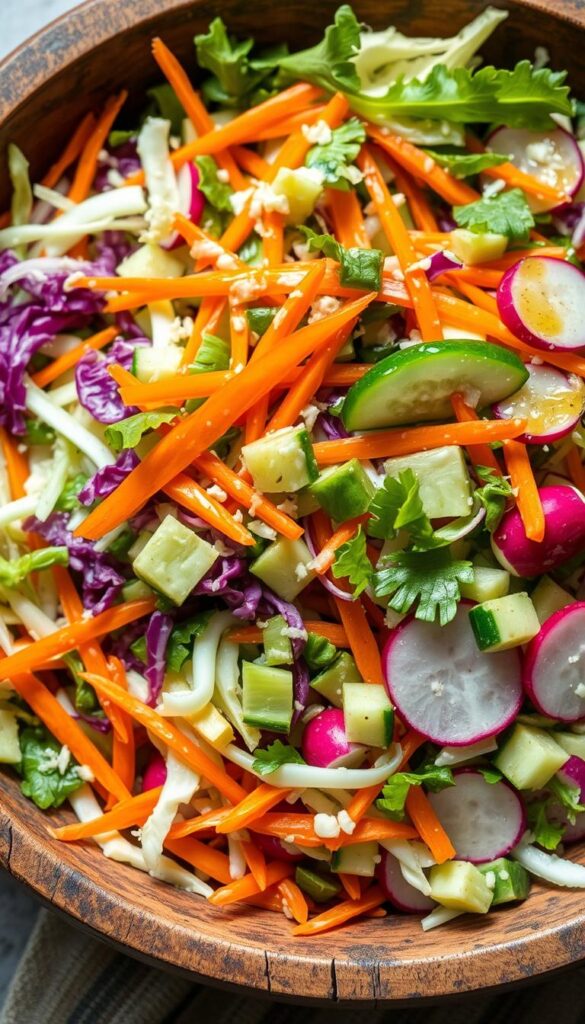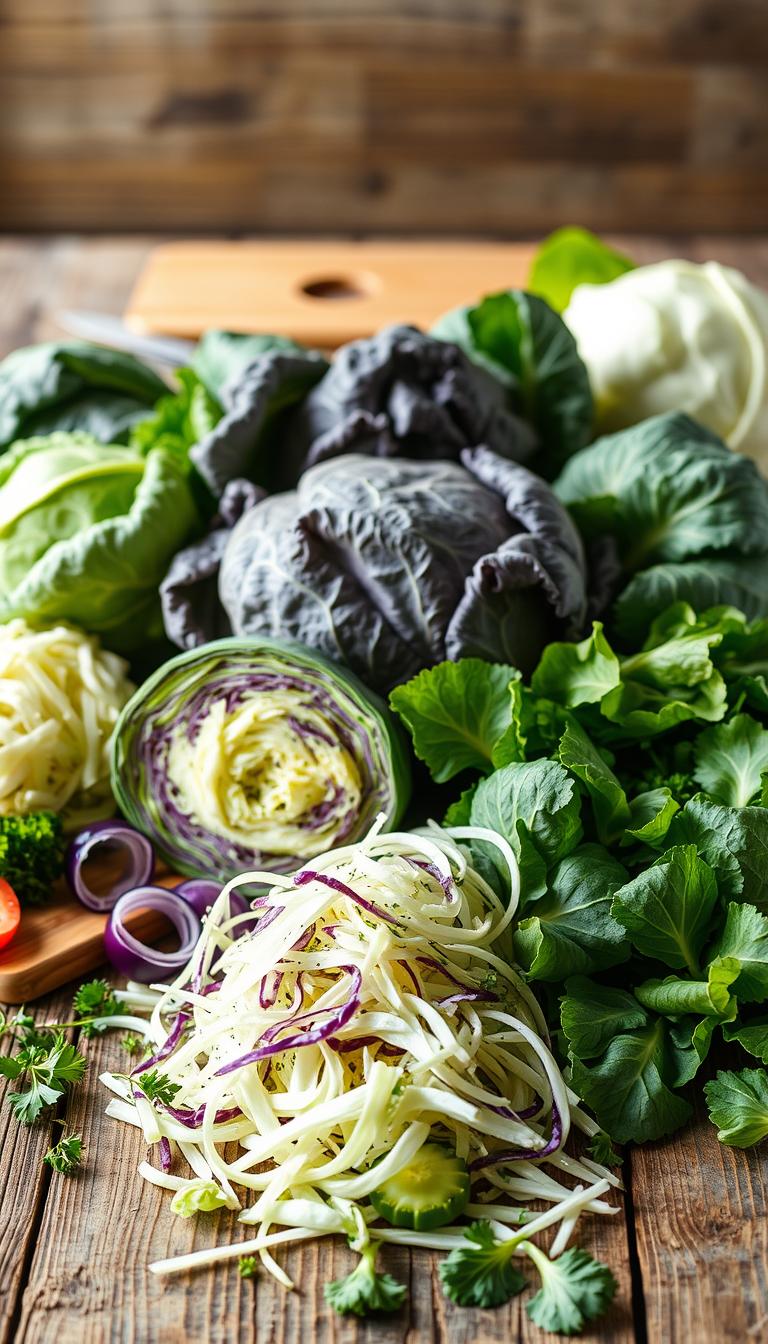Vegan cabbage recipes help you turn an affordable head into quick weeknight wins that taste like more than the sum of simple ingredients.
Want a meal that fits your schedule and budget? You can use a whole head for crunchy salad, shredded slaw, or a roasted dish that holds up for leftovers.
Store an uncut head in a plastic bag in your produce drawer for up to two months. Trim browned leaves and keep the cut surface tightly wrapped to slow browning.
We outline easy ways to match your time and pantry. Expect soups, slaws, stir-fries, and sheet-pan ideas plus tips from Forks Over Knives and science-backed notes on sulforaphane.
Key Takeaways
- Use the whole head: raw for crunch, shredded for slaws, roasted for cozy mains.
- Store uncut in the produce drawer; wrap cut surfaces to prevent fast browning.
- Shredded cabbage lasts about five days in an airtight container; don’t freeze it.
- Pair with aromatics, seeds, and citrus to boost flavor with few ingredients.
- Find main-course ideas and further reading from trusted sources like Forks Over Knives.
Vegan cabbage recipes you’ll love right now

Right now, heads of cabbage are showing up in weeknight bowls, hearty soups, and crunchy slaws across kitchens.
Why it’s trending: It’s budget-friendly, keeps well, and adapts to salads, slaw, soups, stir-fries, and sheet-pan mains. You get big flavor with simple pantry items.
Why this brassica fits plant-based plates
For home cooks who want value and variety, use raw leaves for snap, shredded parts for quick slaw, and inner layers for stuffed rolls. Add a splash of citrus juice to brighten raw prep.
How to use the whole head without waste
Plan a no-waste week: start with a raw slaw, move to a warming soup midweek, then roast the final parts for dinner. Trim browned cut edges—those parts are still usable.
“Use outer leaves for a quick sauté, cores thin-sliced in slaw, and inner leaves for rolls.”
| Use | Part of head | Storage |
|---|---|---|
| Raw slaw | Thinly shredded inner layers | Shredded keeps ~5 days in airtight |
| Sauté | Outer leaves | Whole head lasts up to 2 months bagged |
| Roast / bowls | Wedges and cores | Trim browned parts before use |
For more inspiration, see Forks Over Knives and visit our slaw collection to jump into crunchy ideas.
Raw and crunchy: salads and cabbage slaw ideas

Make raw slaws that stay lively: they add color, texture, and a quick hit of freshness to lunches and dinners. Below are four simple ideas you can mix and match for weeknight crunch and bright flavor.
Red cabbage citrus salad with peanuts and kale
Build an eye-catching red cabbage citrus salad with chopped kale and roasted peanuts. A squeeze of citrus juice keeps the leaves bright and preserves sulforaphane when you serve it raw.
Napa slaw with ginger-soy and seeds
Use napa cabbage for a ginger-soy slaw, then sprinkle toasted seeds for nutty depth. This is an easy entry-level salad that stays crisp if you store dressing separately.
Sushi coleslaw with nori and sesame
Make a sushi-like coleslaw by adding chopped nori and toasted sesame. The umami notes feel playful and pair well with rice bowls or bao.
Everyday green-and-red slaw with Dijon vinaigrette
Toss shredded greens and red cabbage with a simple Dijon vinaigrette. A touch of vinegar and lemon balances sweetness and boosts brassica benefits.
| Dish | Key ingredients | Dressing | Quick tip |
|---|---|---|---|
| Red citrus salad | Red cabbage, kale, peanuts | Citrus juice, olive oil | Dress just before serving |
| Napa ginger slaw | Napa cabbage, ginger, seeds | Soy, rice vinegar | Keep dressing separate to retain crunch |
| Sushi coleslaw | Green cabbage, nori, sesame | Sesame oil, soy | Toast seeds for more flavor |
For more variations, visit our slaw collection and see Forks Over Knives for inspired salad ideas you can make tonight.
Soups and stews that make cabbage the star
When cold weather hits, simmering pots that showcase cabbage bring instant comfort.
Quick color and comfort: Try a purple red cabbage soup with peas, potatoes, thyme, and parsley. It cooks in about 30 minutes and brightens the table.
Pearl barley and bean stew
Make an Irish-style stew with barley and beans where tender veggies soak up a fragrant broth. This hearty dish works well for cold nights and feeds a crowd.
Instant Pot mushroom soup
Use your Instant Pot for a mushroom-rich soup that finishes with quick-pickled toppers for crunch and lift. The sealed pot speeds cooking and deepens flavor.
Squash, cabbage, mustard, and caraway
For fall, simmer squash with shredded leaves and coarse mustard and caraway. The result is German-inspired depth without heavy ingredients.
- Chop and wait 40 minutes before applying heat to boost sulforaphane naturally.
- If you cook first, whisk in a pinch of mustard powder at the end to restore myrosinase activity.
- Layer thyme, rosemary, and parsley to reduce added salt; beans add creaminess and protein.
| Dish | Main ingredients | Time |
|---|---|---|
| Purple red cabbage soup | Red cabbage, peas, potatoes, thyme | ~30 minutes |
| Irish bean & barley stew | Beans, barley, root veggies, herbs | Slow-simmer or batch-cook |
| Instant Pot mushroom soup | Mushrooms, shredded cabbage, pickled toppers | Pressure cook fast |
| Squash & cabbage stew | Squash, shredded leaves, mustard, caraway | Simmer until tender |
Batch-cook a double pot on Sunday to stock your vegan soups hub, and consult Forks Over Knives for more soup ideas and scaling tips.
Stir-fries and noodle bowls for speedy meals
High-heat pans and prepped produce make it easy to pull together a nourishing noodle bowl in minutes. Quick stir-fries keep texture bright and give you a fast weeknight meal without fuss.
Udon with shiitake and snow peas
Make a fast udon stir-fry with cabbage, shiitake, and snow peas. Finish with toasted seeds for a subtle nutty pop and serve in under thirty minutes.
Pancit-style rice noodles
For pancit-style rice noodles, slice veggies thin so they cook evenly and absorb sauce without getting soggy. This method highlights mushrooms and keeps the dish lively.
Miso-ginger noodle soup
Simmer a miso-ginger noodle soup with bok choy and tofu when you want a lighter, restorative bowl. Add tamari and a squeeze of citrus at the end to lift flavors.
Napa peanut stir-fry over brown rice
Build a napa cabbage peanut stir-fry and serve it over brown rice for a balanced meal with protein and fiber.
- Pre-chop veggies and cook noodles ahead to assemble bowls quickly on busy nights.
- Keep heat high and cook in small batches to preserve color and snap in your recipe.
- Rotate mushrooms, snap peas, or baby corn for variety and seasonal freshness.
Want more assembly ideas? See our plant-based bowls guide for sauces and mix-and-match tips, and explore Forks Over Knives for stir-fry technique and inspiration.
Baked, roasted, and sheet-pan cabbage recipes
Roasting turns firm leaves into caramelized edges and tender centers that sing with lemon and herbs. Use a hot oven and a roomy sheet pan so each piece gets direct heat and a crisp edge while staying soft inside.
Lemon-oregano roasted cabbage and potatoes with creamy herb drizzle
Roast wedges and potatoes tossed with oregano, oil, and a little salt. Preheat the oven so the tray meets steady heat and the edges caramelize without steaming.
Finish with a squeeze of lemon juice and a thin creamy herb drizzle. Sprinkle toasted seeds for crunch and an extra layer of texture.
Tomato-baked cabbage rolls with couscous, potatoes, and kale
Layer stuffed rolls in a shallow pan and bathe them in a bright tomato sauce. Bake until the filling is hot and the rolls hold their shape; this dish reheats well and serves as a hearty main or a generous side.
- Keep texture: space pieces on the sheet pan and avoid crowding so steam does not soften edges.
- Sulforaphane tip: chop and wait before roasting, or stir a pinch of mustard powder into the sauce right before serving to restore myrosinase activity.
- Quick prep: line pans for easy cleanup and check seasoning at the end; roasted veg loves fresh herbs and a touch of chili.
| Dish | Main elements | Serving idea |
|---|---|---|
| Lemon-oregano roast | Wedges, potatoes, oregano, lemon | Serve as a bright side dish with a creamy drizzle |
| Tomato-baked rolls | Stuffed rolls, couscous, potatoes, kale | Make the rolls the main or pair with a simple bean salad |
| Sheet-pan seeds finish | Toasted seeds, lemon juice, chili | Add seeds just before serving for crunch |
For more baked ideas that scale for guests, see Forks Over Knives (DoFollow) and our plant-based bowls guide for sides and pairings.
Bowls and meal-prep ideas with big crunch
Prep once and assemble fast: grain bowls let you mix warm rice with cool, crisp toppings in minutes. This approach saves time and keeps textures lively for weekday lunches and quick dinners.
Try two crowd-pleasing builds:
Thai grain bowls with napa cabbage and peanuts
Assemble Thai grain bowls with napa cabbage and peanuts for a crunchy base you can prep ahead. Pack rice, shredded leaves, and toasted peanuts separately to keep crunch until serving.
Southwest burrito bowls with crunchy red cabbage and beans
Build Southwest burrito bowls with crunchy red cabbage, beans, smoky veggies, and cilantro-lime rice for a colorful, sturdy meal. Add roasted sweet potatoes or corn as a hearty side.
- Keep cooked rice and chopped veggies in separate containers to preserve crunch.
- Use a tangy, lightly sweet dressing to complement grains without weighing them down.
- Make sauces in small jars for portion control and easy drizzling at lunchtime.
- If time is short, use pre-shredded part of your cabbage and bagged greens to speed assembly.
- Store components up to 4 days; dress red cabbage just before eating for best texture.
For more templates and sauce swaps, see our plant-based bowls guide and adapt toppings to what you have on hand.
| Bowl type | Key parts | Quick serve tip |
|---|---|---|
| Thai grain bowl | Rice, napa leaves, peanuts, lime | Keep peanuts separate until serving |
| Southwest burrito bowl | Cilantro-lime rice, red leaves, beans, roasted corn | Warm rice, cold toppings for contrast |
| Prep method | Cooked rice, chopped veggies, dressings in jars | Assemble in 5 minutes for a ready meal |
Global flavors to try with vegan cabbage
Stretch one head into four distinct, weeknight-friendly dishes. Each approach highlights different textures and spices so you get variety without fuss.
Szechwan-inspired creamy peanut slaw with beans and millet
Go spicy-sweet with a creamy peanut dressing, cooked beans, and millet. Adjust chili for heat and finish with a sprinkle of seeds for crunch.
German-style braised red cabbage with mustard and apples
Braise shredded red cabbage with apples and a splash of vinegar to balance the sweetness. Cover loosely so steam softens the leaves while flavors concentrate.
El Salvador–inspired burgers topped with tangy slaw
Top plantain-black bean burgers with a tangy slaw for a craveable handheld dish. The slaw adds bright acidity that lifts the burger.
Chinese greens medley with mushrooms
Stir-fry bok choy, gai lan (Chinese broccoli), and ong choy with mushrooms, ginger, and soy. Serve the mix with noodle or rice bowls and add browned tofu cubes for protein.
“Lean on aromatics like ginger, garlic, and scallions to build depth rather than salt.”
| Dish | Key note | Serve suggestion |
|---|---|---|
| Szechwan slaw | Spicy peanut, beans, millet | Cold side or grain bowl |
| Braised red | Mustard, apples, vinegar | Warm side with roasted root vegetables |
| Plantain burgers | Tangy slaw topping | Handheld with a side salad |
| Chinese greens | Ginger-soy, mushrooms, broccoli | Over noodle or rice |
For fully tested global recipes, see Forks Over Knives (DoFollow) for detailed method and timings.
Health perks of cabbage and how to maximize them
A brief pause between slicing and cooking makes a big difference for the beneficial compounds in brassicas. These vegetables deliver fiber, vitamins, and a nutrient profile tied to long-term health. You can use simple steps to keep those benefits high in your next meal.
Fiber, longevity, and the Brassicaceae advantage
Brassicas such as cabbage and kale add fiber that supports satiety and gut health. Rotate them with beans and whole grains to build nutrient-dense plates that support longevity.
Chop & wait: boost sulforaphane before cooking
When you chop raw leaves, myrosinase enzymes convert precursors into sulforaphane. Let sliced pieces sit about 40 minutes before you apply heat. That extra time maximizes formation so cooking doesn’t erase the benefit.
Mustard powder hack to restore myrosinase after heat
If you don’t have the time to wait, add a pinch of mustard powder after cooking. Mustard reintroduces myrosinase activity and helps form sulforaphane from the remaining precursors.
- Enjoy raw slaws with lemon or vinegar to support sulforaphane in uncooked salads.
- If raw texture is tough for you, lightly steam after the 40-minute wait to keep pleasant bite and color.
- Skim salt by using herbs and aromatics so the vegetables stay the star.
Read an evidence-based explainer on sulforaphane and myrosinase at NutritionFacts.org for the full science on time and temperature.
Smart shopping, storage, and prep tips for cabbage
Choose a firm, heavy head at the market to get the best texture and shelf life. A dense head signals freshness; loose, light heads can be older or dried out.
How to store whole, cut, and shredded
Keep an uncut head bagged in your crisper; it can last up to two months when stored cold. Remove any browned outer leaves and use the inner layers.
If you cut a head, wrap the exposed face tightly in plastic. Slight browning may appear after a couple of days—trim the edge and use the rest.
Shredded slaw stays best in an airtight container for up to five days. Batch-shred only what you’ll use in a couple of days to reduce waste.
What not to do: why freezing harms texture
Do not freeze cabbage. Ice crystals break cell walls and make leaves limp after thawing. For crisp slaw or stir-fries, avoid freezing and plan fresh prep instead.
- Wash produce just before use; early washing can add moisture and shorten shelf life.
- Keep key ingredients—carrots, scallions, and herbs—on hand to assemble slaw or stir-fries fast.
- If you shop weekly, buy one firm head and one bagged shred to cover a couple of quick dinners.
| Item | Storage | Tip |
|---|---|---|
| Whole head | Plastic bag in crisper, up to 2 months | Peel off outer leaves as needed |
| Cut head | Wrapped tight in plastic, a few days | Trim browned face before use |
| Shredded slaw | Airtight container, up to 5 days | Store dressing separately for crunch |
Ingredient pairings that make vegan cabbage recipes pop
A few smart pairings will lift your next cabbage-driven bowl from plain to memorable. Start with acid and aromatics, then add texture and protein so each bite feels balanced.
Acid and aromatics
Lemon juice or a splash of vinegar brightens raw mixes and tempers the vegetable’s natural sweetness.
Lean on ginger and garlic to build aroma. These aromatics make a simple dish feel restaurant-worthy.
Texture boosters
Finish plates with toasted seeds or a handful of peanut for crunch and healthy fats.
Toasted croutons or crisp shallots add another crispy layer that contrasts soft fillings.
Plant proteins that thrive with cabbage
Pair beans or tofu for a filling, plant-forward meal. Quinoa or rice help soak up dressings and round out the plate.
A pinch of mustard in dressings deepens flavor and ties brassica notes together.
- Add vinegar and lemon juice to raw mixes to brighten flavor.
- Use ginger and garlic to build aroma and depth.
- Layer textures: crisp slaw base, creamy beans, crunchy toppers.
- Keep a pantry kit—vinegars, citrus, tamari, and toasted seeds—for fast weeknight wins.
| Flavor role | Examples | Why it works |
|---|---|---|
| Acid | Lemon, rice vinegar | Brightens and balances sweetness |
| Aromatics | Ginger, garlic | Builds savory depth |
| Crunch | Seeds, peanut, croutons | Contrasts soft textures |
| Protein & starch | Beans, tofu, rice | Makes the plate filling and complete |
Explore our slaw collection for dressing ideas, and see Forks Over Knives for pairing inspiration you can adapt to your pantry.
Quick weeknight cabbage ideas under thirty minutes
For busy weeknights, a wide pan and a few bold pantry items will get a vibrant cabbage skillet on the table in minutes. These two builds focus on speed, texture, and pantry-friendly flavor so you can eat well without fuss.
Skillet cabbage with miso-maple vinaigrette
Sauté shredded cabbage in a wide pan over high heat to get browned edges and avoid steaming. Whisk miso and maple with warm water, drizzle at the end, and toss off-heat for a glossy finish.
Why it works: miso adds umami quickly, maple balances salt, and the wide pan keeps bites crisp. Add scallions and herbs after cooking to keep flavors bright.
Five-ingredient cabbage and bean skillet bowl
Build a simple bowl using shredded cabbage, cooked beans, an aromatic (garlic or ginger), a handful of greens, and a squeeze of citrus. Cook the aromatics first, add cabbage, then fold in beans to heat through.
- Use a wide pan to prevent steaming and keep bite.
- Top with toasted nuts or seeds for crunch or serve with a roasted side dish like carrots.
- If you own an Instant Pot, par-cook beans for the week to speed nightly dinners; swap in a quick-cook noodle for a slurpable option.
| Idea | Main parts | Quick tip |
|---|---|---|
| Miso-maple skillet | Shredded cabbage, miso, maple | Whisk miso with warm water; drizzle off-heat |
| 5-ingredient bean bowl | Cabbage, beans, aromatics, greens, citrus | Use canned beans or pre-cooked pot beans to save time |
| Noodle swap | Quick-cook noodle, cabbage, sauce | Add noodles last and toss briefly to combine |
Want more builds? Check our plant-based bowls guide for fast sauces and bowl formulas, and see trusted sites like Forks Over Knives for quick miso-dressed slaws and other fast ideas.
Resources and links to keep you inspired
Turn to evidence-backed guides and curated collections when you need fast, reliable meal builds. Below are a few high-value sources and internal pages to bookmark as part of your meal-planning routine.
External guides to follow
Explore more vegan cabbage recipes at Forks Over Knives for tested ideas across soups, slaws, stir-fries, and stews.
Learn the science of sulforaphane and myrosinase at NutritionFacts.org so you can use simple timing tricks like chop & wait or mustard-powder fixes.
Related pages on this site
- Visit our vegan soups hub for cozy bowls and batch-cook plans.
- See the plant-based bowls guide for modular templates that speed weeknights.
- Browse the slaw collection for crunchy sides you can assemble in a couple of minutes.
| Resource | Focus | Why use it |
|---|---|---|
| Forks Over Knives | Tested recipes | Great for meal ideas you can trust |
| NutritionFacts.org | Science | Practical tips on sulforaphane and prep |
| This site | Hubs & guides | Quick templates for bowls, slaw, and soups |
Quick tip: skim ingredient lists before shopping and keep acids, aromatics, and whole grains stocked so any dish comes together in a couple of steps.
Conclusion
A well-used head can feed a week. Treat one head cabbage as a toolkit: crisp salad and slaw for lunches, an oven wedge as a bright side, and warm bowls for simple dinners.
Mix raw crunch with cooked comfort to keep meals varied. Try red cabbage in soups and slaws, and napa cabbage for fast sautés and noodle bowls.
Round plates with tofu, beans, grains, and herbs so every dish feels balanced. Small storage habits stretch a head and cut waste.
Keep this guide handy and explore the linked resources for tested vegan cabbage recipes and more cabbage recipes ideas. Bookmark the page for fresh inspiration and quick technique refreshers.




